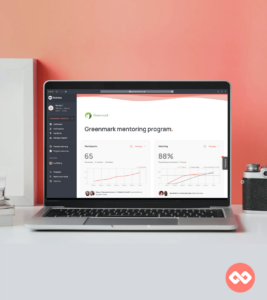Employee mentoring has always been an important asset of any organization – both on the supply-side (mentors), and the demand side (mentees). Today, it is equally beloved, with the latest studies pointing to the fact that 66% of millennials want a workplace mentor – and that 79% of the millennial demographic consider mentoring critical to their success.
On the other side of the mentoring equation, three-quarters of executives credit their mentors with helping them reach their current positions, a stat which makes it obvious why so many experienced employees choose to give back in the form of mentoring.
So we know that the desire for mentoring is there. But mentoring today is a lot more important than that because it serves as an insurance policy in an increasingly precarious workplace.
If mentoring was ever just a nice-to-have – it no longer is today.

The world of work has changed dramatically in recent years, and even more so in the past few. With the rise of remote work, increased competition, and high levels of uncertainty, it’s more important than ever for organizations to invest in employee growth and development. One powerful, recession-proof tool for doing so is mentoring. In this article, we’ll explore the benefits of mentoring, how it can help address key challenges in the current climate, and how to make it accessible to all employees
Benefits of Mentoring for Employees in the Current Climate
One of the most compelling reasons to invest in mentoring is the positive impact it can have on employee development and job satisfaction. By pairing less experienced employees with seasoned professionals, organizations can help employees develop new skills, build confidence, and gain valuable insights into their roles and the industry as a whole. In addition, mentoring can be a powerful way to build relationships, connect with colleagues, and foster a sense of belonging within an organization – which is especially important in a remote work environment.
Mentoring helps employees navigate the challenges of the current climate. With the pandemic and economic uncertainty, many employees are feeling overwhelmed and uncertain about their future. Mentors provide guidance and support, helping employees to stay focused and motivated, and providing a sounding board for their concerns and ideas. This can be especially valuable for employees who are new to the organization or who are working in a new role.
It’s also a powerful way to promote diversity and inclusion within an organization. By pairing employees from different backgrounds and experiences, organizations can help to break down barriers and promote understanding and empathy. This can lead to a more inclusive and supportive workplace culture, where all employees feel valued and respected. For this reason, Reverse Mentoring is one to be explored or DEI-focussed programs such as this one from USTA (case study).
Learn more about 40 Mentoring Program Benefits You Won’t Want To Miss.
Diving Further into an Uncertain Future
A mentor is arguably most helpful at a crossroads; a point in time when an individual or employee feels uncertain of which road to take at a pivotal juncture.
These crossroads are becoming more and more frequent as the world evolves ever more quickly. 10 or so years ago, a graduate could choose their career path and make incremental progress in the knowledge that they had a decent runway. Today, recent graduates – and all employees – are being told that the profession they have spent 4 or 5 years studying – or 10 or 15 years working in – is about to be redundant, with various studies pointing to the fact that 40% of all jobs are at risk of automation by the year 2025 – or by artificial intelligence.
While most mentors can’t explain to their mentees what the future will look like, they can provide guidance on sensible steps to move forward and mitigate the chances of failure. A mentor can also provide reassurance against uncertainty – a priceless benefit of mentoring – that rapid change has also been happening during their whole careers (even if at a slower pace), and that change is good so long as you’re proactive in adapting to it.
Download Guide: How to Lead and Mentor through Uncertainty and Change
The Role of Mentoring in Employee Engagement
Employee engagement is a critical factor for success in any organization, but it can be especially challenging to achieve in the current climate. With high levels of uncertainty and remote work, it’s easy for employees to feel disconnected from the organization and their colleagues. However, mentoring can be an effective way to boost engagement by creating opportunities for regular check-ins, feedback, and goal-setting. This can help employees feel more invested in their work, more supported, and more likely to stay with the organization long-term.
There are also many positive impacts for the mentor. Mentors often report feeling a sense of fulfillment and satisfaction from helping others grow and develop in their careers. It can also provide mentors with an opportunity to reflect on their own experiences and skills, and to gain new perspectives from their mentees. Ultimately, mentoring is truly a mutually beneficial relationship that contributes to a positive and productive work environment.
How Mentoring Can Help Address Burnout
Burnout is a growing issue in many industries, with employees feeling overworked, stressed, and less engaged in their work. However, mentoring can be a powerful way to address burnout by providing employees with support, guidance, and new perspectives on their work. By fostering a sense of connection and community, mentoring can help employees feel more resilient in the face of challenging workloads and demanding deadlines.
Mentoring can also help employees develop new skills, strengths, and knowledge, which can increase their confidence and sense of accomplishment. This can be especially important for employees who feel stuck in their current roles or who are struggling to find meaning in their work. By working with a mentor, employees can explore new opportunities and gain a better understanding of their strengths and weaknesses, which can help them make more informed decisions about their career paths.
Learn more: How a psychologically safe environment can help reduce stress and burnout.
Leveraging Mentoring to Strengthen Team Dynamics
In order to perform effectively, teams need strong relationships and a sense of shared purpose. However, these can be challenging to build and maintain in a remote work environment. Fortunately, mentoring can help. By encouraging cross-team connections and providing opportunities for relationship-building, mentoring can help team members feel more connected, more invested in their work, and more supportive of one another.
Moreover, mentoring can also help team members develop new skills and knowledge. By pairing less experienced team members with more experienced mentors, team members can learn from each other and gain valuable insights into different aspects of the business. This can lead to increased innovation, better problem-solving, and a more well-rounded team overall.
Taking Mentoring to the Next Level in the Digital Age
With the rise of digital tools and platforms, it’s easier than ever to create effective mentoring programs that cater to the needs of modern employees. By leveraging technology to facilitate connections, track progress, and provide insights, organizations can create powerful mentoring programs that meet the needs of employees and provide measurable benefits to the organization as a whole.
Explore how Sentiment on the Mentorloop platform can help you track the art and science of mentoring success.
One of the key advantages of digital mentoring programs is the ability to connect employees across different locations and time zones. This is particularly important for global organizations, where employees may be spread out across multiple countries and regions. With digital tools, mentors and mentees can connect virtually, allowing for more flexibility and convenience in scheduling meetings and discussions.
Another benefit of digital mentoring is the ability to track progress and measure the impact of the program. By using data analytics and reporting tools, organizations can gain insights into the effectiveness of their mentoring programs and make adjustments as needed. This can help to ensure that the program is meeting the needs of employees and providing tangible benefits to the organization
The Challenges of Mentoring in a Remote Work Environment
While mentoring can be highly effective in addressing key challenges, there are some challenges that are unique to a remote work environment. For example, it can be more difficult to build relationships and provide regular feedback when employees are not physically present. However, by leveraging digital tools, focusing on clear communication, and establishing expectations around check-ins and availability, organizations can create successful mentoring programs in nearly any environment.
Navigating the Loss of the Office Water Cooler
Another challenge of mentoring in a remote work environment is the lack of informal interactions that occur in a traditional office setting. These informal interactions can be valuable for building relationships and trust between mentors and mentees. To overcome this challenge, organizations can encourage mentors and mentees to schedule virtual coffee breaks or informal check-ins to build rapport and strengthen their relationship.
We know all too well that remote work can lead to feelings of isolation and disconnection, which can negatively impact the effectiveness of mentoring relationships. To address this, organizations can create virtual communities or forums where mentors and mentees can connect with each other and share their experiences. This can help to foster a sense of belonging and support, which can ultimately lead to more successful mentoring relationships.
The Rise of Services
As more and more jobs are lost to automation, AI, and increasingly sophisticated products and technologies, it will become increasingly important for employees to focus on and develop soft skills; skills as leadership and communication.
We have seen what happens when manually laborious jobs like manufacturing are taken away; service jobs take over as people have more time – and more money – to spend servicing the needs and wants of other people. Managing and collaborating in this new people-to-people economy requires skills that are developed through channels like mentoring – not online courses. Mentoring provides employees with the universally applicable skills to overcome the inevitable upheaval headed our way.

Making Mentoring Accessible to All
Finally, it’s important to ensure that mentoring programs are accessible to all employees, regardless of their background or level of experience. This can be achieved by providing mentoring opportunities to employees at all levels, encouraging participation from a diverse range of employees, and providing resources and support for both mentors and mentees. By creating an inclusive mentoring program, organizations can help all employees feel valued, supported, and empowered to grow and succeed in their roles.
One way to make mentoring more accessible is to offer virtual mentoring options. This can be especially helpful for employees who work remotely or have scheduling conflicts that make it difficult to participate in traditional in-person mentoring programs. Virtual mentoring can also provide opportunities for employees to connect with mentors outside of their immediate department or location, expanding their network and exposure to different perspectives and experiences – this is made incredibly easy with tools such as Mentorloop.
A Sense of Belonging
Millennials get a lot of attention when it comes to their workplace traits. But most observers fail to see the root cause of these traits – and the underlying thread.
Millennials are simply looking to make their work a deeper part of their lives. They care about progress in the workplace because their identity is more closely aligned with their job than ever before; they care about purpose in the workplace because they see this as purpose in their lives; and they want to have strong connections and engagement with the people who they work with because they see work and their fellow employees as their second home and family.
Mentoring plays a pivotal role in these needs and will continue to do so as the workplace continues to veer in this direction. It provides young professionals with another channel for the progress they deeply desire; it allows them to act on and pursue the purpose they crave; and allows them to develop the professional connections they need in an increasingly disconnected world.
Explore: How Belonging and Employee Retention are Linked
How Mentorloop is Supporting Global Organizations
At Mentorloop, we specialize in creating effective, accessible mentoring programs for organizations of all sizes and industries. Our platform provides a range of features that make it easy to connect employees, track progress, and provide valuable insights into program outcomes. Whether you’re looking to create a mentoring program from scratch or improve an existing one, our team is here to help. Contact us today to learn more.
Overall, mentoring is a powerful tool for boosting employee growth, engagement, and satisfaction in the current climate. By making it accessible to all employees and leveraging the latest digital tools and insights, organizations can create powerful mentoring programs that benefit both employees and the organization as a whole.
Mentoring has always been an incredible tool, which is why people have always wanted to experience it – and why companies have often offered it.
But it’s no longer a nice-to-have. Your employees – and all of us – need mentoring. More than ever.




